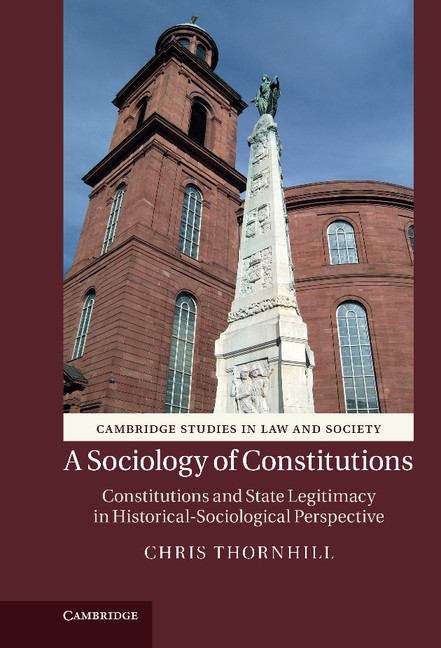A Sociology of Constitutions: Constitutions and State Legitimacy in Historical-sociological Perspective
By:
Sign Up Now!
Already a Member? Log In
You must be logged into Bookshare to access this title.
Learn about membership options,
or view our freely available titles.
- Synopsis
- Using a methodology that both analyzes particular constitutional texts and theories and reconstructs their historical evolution, Chris Thornhill examines the social role and legitimating status of constitutions from the first quasi-constitutional documents of medieval Europe, through the classical period of revolutionary constitutionalism, to recent processes of constitutional transition. A Sociology of Constitutions explores the reasons why modern societies require constitutions and constitutional norms and presents a distinctive socio-normative analysis of the constitutional preconditions of political legitimacy. During the emergence of sociology as an academic discipline the question about the origins, status and functions of constitutions was widely posed. Indeed, for both thematic and methodological reasons, the analysis of constitutions was a central aspect of early sociology. Sociology developed, however ambiguously,as a critical intellectual response to the theories and achievements of the Enlightenment in the eighteenth century, the political dimension of which was centrally focused on the theory and practice of constitutional rule. In its very origins, in fact, sociology might be seen as a counter-movement to the political ideals of the Enlightenment, which rejected the (alleged) normative deductivism of Enlightenment theorists. In this respect, in particular, early sociology was deeply concerned with theories of political legitimacy in the Enlightenment, and it translated the revolutionary analysis of legitimacy in the Enlightenment, focused on the normative claim that singular rights and rationally generalized principles of legal validity were the constitutional basis for legitimate statehood, into an account of legitimacy which observed political orders as obtaining legitimacy through internalistically complex, historically contingent and multi-levelled processes of legal formation and societal motivation and cohesion. This is not to suggest that there existed a strict and unbridgeable dichotomy between the Enlightenment, construed as a body of normative philosophy, and proto-sociological inquiry, defined as a body of descriptive interpretation.
- Copyright:
- 2011
Book Details
- Book Quality:
- Publisher Quality
- ISBN-13:
- 9780521116213
- Publisher:
- Cambridge University Press
- Date of Addition:
- 07/15/11
- Copyrighted By:
- Chris Thornhill
- Adult content:
- No
- Language:
- English
- Has Image Descriptions:
- No
- Categories:
- Nonfiction, Law, Legal Issues and Ethics
- Submitted By:
- Bookshare Staff
- Usage Restrictions:
- This is a copyrighted book.
